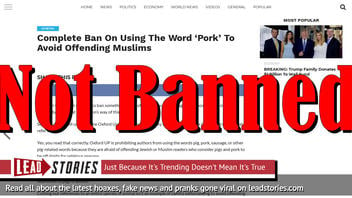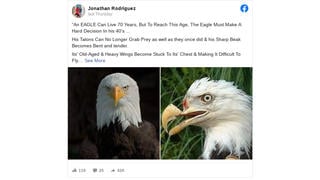
Did the Oxford University Press issue a complete ban on using the word "pork" (or other pig related terms) to avoid offending Muslims? No, that's not true: a memo reminding authors of children's books to be culturally sensitive when writing for foreign markets was misinterpreted as a "complete ban on using the word 'pork'" in 2015 and the story has been endlessly copy-pasted since then even though it is not true.
A recent copy of the story appeared as an article published on May 10, 2019 by a website named Trump Feed titled "Complete Ban On Using The Word 'Pork' To Avoid Offending Muslims" (archived here) which opened:
When an institution sets out to ban something, more often than not the thing they choose to ban simply reflects back on that institution's way of thinking
So what does it tell us about the Oxford University Press that they are banning authors from using words that refer to pigs?
Yes, you read that correctly. Oxford UP is prohibiting authors from using the words pig, pork, sausage, or other pig-related words because they are afraid of offending Jewish or Muslim readers who consider pigs and pork to be off-limits for religious reasons.
Now, I can understand how Oxford UP would perhaps consider editing out a photo of someone stuffing their face with bacon in a manuscript where another photo could equally serve a purpose, but to eliminate all references to pigs is absurd.
Users on social media only saw this title, description and thumbnail:
Complete Ban On Using The Word 'Pork' To Avoid Offending Muslims
When an institution sets out to ban something, more often than not the thing they choose to ban simply reflects back on that institution's way of thinking So what does it tell us about the Oxford University Press that they are banning authors from using words that refer to pigs? Yes, you read that correctly. ...
Here is one of the oldest versions of the story we could find, which was published in 2015:
ABSURD: Complete Ban On Using The Word 'Pork' To Avoid Offending Muslims
When an institution sets out to ban something, more often than not the thing they choose to ban simply reflects back on that institution's way of thinking. So what does it tell us about the Oxford ...
That seems to have been based on news reports from 2015 that only mention children's books:
Oxford University Press bans use of pig, sausage or pork-related words to avoid offending Muslims
The Oxford University Press has warned its writers not to mention pigs, sausages or pork-related words in children's books, in an apparent bid to avoid offending Jews and Muslims. Speaking on Radio 4's Today programme, presenter Jim Naughtie said: "I've got a letter here that was sent out by OUP to an author doing something for young people.
It has this quote from Jim Naughtie:
Speaking on Radio 4's Today programme, presenter Jim Naughtie said: "I've got a letter here that was sent out by OUP to an author doing something for young people.
"Among the things prohibited in the text that was commissioned by OUP was the following: Pigs plus sausages, or anything else which could be perceived as pork.
"Now, if a respectable publisher, tied to an academic institution, is saying you've got to write a book in which you cannot mention pigs because some people might be offended, it's just ludicrous. It is just a joke."
That quote led to a lot of controversy and a few days later Jane Harley from Oxford University Press issued following clarification:
No, we haven't banned books on pigs - but sensitivity is key in global publishing | Jane Harley
Jane Harley: At Oxford University Press we have to balance children's cultural and learning needs, while retaining some healthy common sense
Key quotes:
To clarify, OUP does not have a blanket ban on pork products in its titles, and we do still publish books about pigs.
and:
To address children's learning needs, it is important that they also reflect the cultural context in which children are learning. In the UK, we take it for granted that we would not include references to sex, violence, or alcohol in our textbooks; to do so would be considered inappropriate and offensive to many. In order to make an impact around the world, there are other sensitivities that, although not necessarily obvious to some of us, are nonetheless extremely important to others.
So no, there is no "complete ban" on using the word "pork", not even in Oxford University Press books.
NewsGuard, a company that uses trained journalist to rank the reliability of websites, describes trump-feed.com as:
A conservative site that re-posts stories from other sites without credit, including many that are false.
According to NewsGuard the site does not maintain basic standards of accuracy and accountability. Read their full assessment here.
We wrote about trump-feed.com before, here are our most recent articles that mention the site:
















